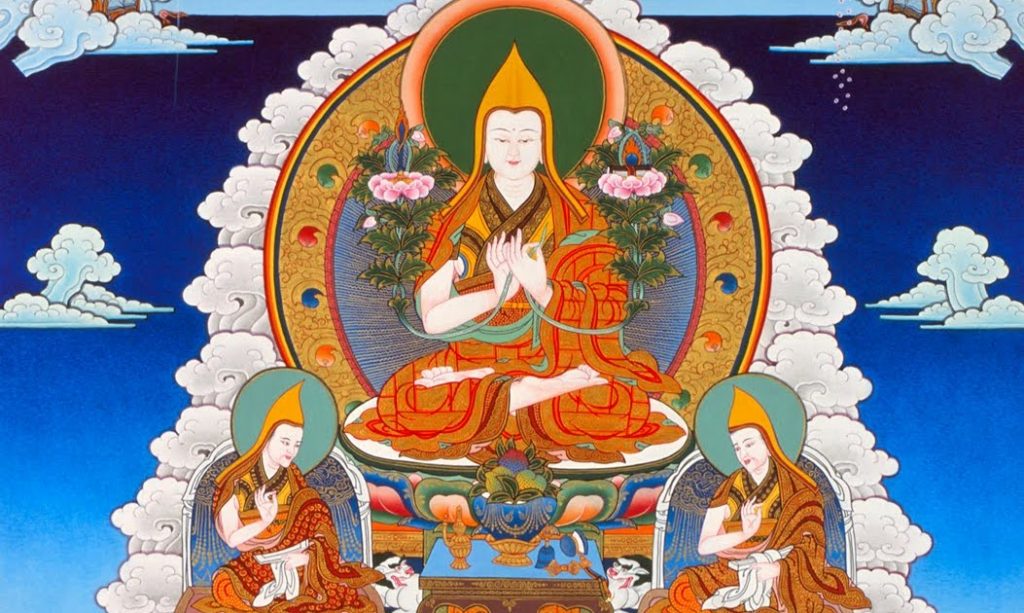Week 2: Persuading to Listen
Last week we talked about the first stanza (“The Promise to Compose”)
The first stanza talks about the main topic at hand, while the second stanza talks about to whom (the target audience) this subject is suitable for.
We focus on:
o Renunciation
o Having a Bodhicitta mindset
o Realizing emptiness
Today we will look at the second stanza as follows:
[2] Those who are not attached to the pleasures of circling [samsara],Who strive to make freedom and endowments meaningful,
Who entrust themselves to the path pleasing the Victorious Ones –
You fortunate ones: listen with a calm mind.
Stanza 2, LINE 1: “Those who are not attached to the pleasures of circling [samsara]”
We might ask ourselves, what kind of person is this text composed for?
The sentence, “those who are not attached to the pleasures of circling” refers to the circling as samsara.
Individuals who take rebirth come into the world because of the power of karma, individuals who take rebirth and are in the cycle of samsara take a physical body. Such bodies are impure and are bound to suffering. This is because we are attached to impure feelings. Even our happiness gives suffering. The nature of our body causes suffering because it naturally decays and gets older and older. In due time, the body will give rise to pain, suffering, and disease.
We are attached to a body that only gives suffering. This book is for those people who are not attached to the pleasures caused by samsaric existence.
To understand what detachment is, you must understand what attachment is. Attachment is seeing the nature of suffering—this book is not for those people who are attached to cyclic existence.
Stanza 2, LINE 2: “Who strive to make freedom and endowments meaningful,”
Human rebirth is considered a great endowment. In fact, human rebirth is part of the 8 freedoms and 10 endowments. This is book is for those want to make this human rebirth a meaningful one. We are born in such a condition that we can see, hear, and have senses. We have the ability to reflect, and to transform the mind. We have the ability to bring change into the world.
This book is for those who want to make human rebirth a meaningful one. There are many people who are very satisfied with the current situation. For example, such people are like the Gods. They like what they have, and are too busy enjoying their riches that they don’t see the importance of kindness, compassion, and love. The people who are attached to the materialistic world won’t be able to find the time to practice. So many people in the world work so hard so that they can have proper facilities. People think that this is the source of happiness. Modern education teaches that material is the source of happiness—but this is the problem. Love, compassion and meditation are so important –if we don’t practice these things, then we will have wasted our life.
Are rich people happiest? No, that’s not the case. What’s the point of having all the material comforts if you can’t sleep well at night? If those people in the materialistic world just spend a bit of time for meditation, develop better concentration, then those people can transform their lives.
Without having a compassionate and loving mind, there is no way to achieve happiness. We should try to make this life a meaningful one by transforming the mind. This is important because it is our mind that travels to the next life, not our bodies.
Let me now describe the 8 Freedoms. Overall, if you’re born in some situations, you may not have the opportunity to practice the dharma.
- Freedom from being born in the hell realm: If you are born in hell, then you will not be free to practice dharma.
- Freedom from being born in the hunger ghost realm: If born as a hungry ghost, all the time would be spent to satiate hunger that there would not be time to practice dharma.
- Freedom from being born in the animal realm: Animals can’t practice dharma that much because they live in fear of being hurt by other animals.
- Freedom from being born as a barbarian: We see the importance of practicing dharma while barbarians do not.
- Freedom from being born as a long-lived God: There are some God realms where you live for a very long time. In fact, such Gods may just be sleeping while other Gods live in the desire realm.
- Freedom from being born with wrong views: If you don’t believe in karma, if you don’t believe that love and compassion are strengths, then you won’t be free to practice the dharma. Some people believe that practicing dharma is a sign of weakness, which is not the case.
- Freedom from being born in a time without the Enlightened Beings or dharma: We are born in a time when the teachings of Buddha still exist. If we are born in a time when the Buddha’s teachings are not alive, then such reality would be truly unfortunate. We won’t be able to understand the teachings and methods of the Buddha, especially to practice positivity.
- Freedom from being born as deaf and mute: We have the ability to discuss how to be positive, and have the ability to listen to the dharma.
Next, let’s go over the 10 Endowments:
The first 5 endowments can be found within oneself:
- Having been born as a human being.
- Having been born in a central region where the Buddha appeared.
- Having been born with all of one’s faculties: Having the five senses, which helps us.
- Being engaged in an appropriate lifestyle that is in line with the dharma: For example, we should feel fortunate that we don’t make a living out of cheating others or killing animals.
- Having faith in the sacred teachings. We should feel fortunate about having faith. Some people believe in cheating others. We believe in the teachings of the Buddha, and we believe in karma. We believe in living in harmony with nature.
The next 5 endowments that are found in external circumstances
- The fact that an Enlightened Being has appeared.
- The fact that the Enlightened Being has shared the teachings. Even if an Enlightened Being has appeared, this does not guarantee that such a being would leave any teachings behind. In some time periods, an Enlightened Being has not left behind any teachings.
- The fact that the teachings exist. Although an Enlightened Beings gave teachings, we should feel fortunate that the teachings still remain.
- The fact that the teachings are practiced. We should be grateful that the teachings are taught and that there are commentaries to explain how to practice.
- The fact that there are kind-hearted people willing to share the teachings.
Stanza 2, LINE 3: “Who entrust themselves to the path pleasing the Victorious Ones –
The line “The path which pleases the Victorious One” talks about the Path that composes of these things:
o Renunciation
o Having a Bodhicitta mindset
o Realizing emptiness
The ‘victory’ here refers to those who have overcome the negative afflictions. The Victorious One refers to the Buddha who has overcome the negative emotions. It also refers to individuals who embody these three principals.
Stanza 2, LINE 4: “You fortunate ones: listen with a calm mind.”
Instead of the word “calm” here, I think the English translation should be “faith” or “devotion.” Actually, the “calm mind” referenced here could be translated as the “trusted mind” or “devoted mind.”
If you are able to do embark on this path with these three qualities, then you are fortunate. The reason why it is called “principals” is because it’s the three main points that help you achieve Buddhahood.
By Teak (Noted down from the Teaching on 24 Feb 2021 by Lama Nawang Kunphel)

